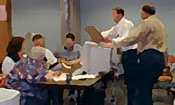

Chapter 17 - The Crow's Nest: Keeping an Eye on the Horizon
In building an action plan, the school council introduces periodic reassessment activities which will make certain that the innovation is modified and adjusted as conditions change and learning accumulates. In Chapter 16 this process was further supported by a consulting function involving others from outside the school in the school's thinking about the innovation.The crow's nest is a reference to the look-out poised aloft in sailing vessels, a point of reference which gave the captain insight about what lay ahead because the elevation allowed the ship to look around the earth's curved surface. If we try to see what's coming by peering ahead from where we stand on deck, we can see much less. We need to think about ways to provide a lookout's vision to schools, especially since most schools have suffered from nearsighted behavior.
There are several components which can be built into schools which will deliver perspective. First of all, each school must learn to demand appropriate consulting services from central office. The transition has been difficult for central office personnal in many districts which have moved to site-based management because individuals have not shifted easily from a commanding to a supportive role. School councils can help ease this transition, then, by being clear about ways these people can prove helpful.
Central office should provide customized services in each of the following areas:
1) Research
There are efficiencies to centralizing the research function with personnel that is professionally trained. They should be tracking the latest developments related to each school's project and keeping the school council aware of what is happening elsewhere.
2) Staff Development
Effective research-based staff development is a relatively recent development. It makes sense to assign the design of programs to those who are well versed in this research and effective models. The school council can describe its needs and collaborate on the design, but much valuable time might be lost if a group planned its own training and learning experiences without knowing anything about andragogy and the lessons learned by human resource professionals during recent decades.
3) Program Design
When selecting strategies and program components, central office personnel may be valuable as partners who can share what they have learned about this thought process in the past. They may not direct the council as to how to proceed, but they may suggest models and provide templates.
4) Program Evaluation
Reliable and valid program evaluation is a science which requires careful experimental design as well as statistical savvy. Few schools have within their staffs people who possess such skills. The school council may be able to frame its evaluation issues adequately, but they would be wise to seek expertise to assist with this highly technical but politically sensitive task. As we have seen earlier, the match between program goals and evaluation design must be well established in order to avoid the appearance of failure when great success is actually at hand.
5) Grant-Making
Seeking external support and expanded resources is an important strategy to enhance the effectiveness of innovations, but the skills employed are once again an area of specialization. Studies of grant writing have demonstrated that the value of the total time consumed by all grant writers sometimes exceeds the funds available. It makes little sense for members of the school council to pour long hours into grant seeking unless there is some existing talent and previous experience on the school team. Central office personnel, if properly equipped, can become important allies in the search for extra resources.
All of the above sources of central office consultant support depend, of course, on the existence of properly prepared individuals. All too often the person assigned to staff development may know very little of the research and the person who does grants may not be very helpful at all. These are judgments which must be made by each school council as they assess the quality of available services.
If central office has been stripped of such helpful resources or if the quality is mediocre, then each school council must begin developing school resources to scan the horizon.
Copyrighted 1991 by Jamie McKenzie, all rights reserved.